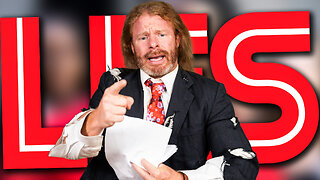Can't Have It Both Ways
Like and subscribe. This is an archive channel, i'm not the owner of the content, check the link in the end. Please consider supporting my work through Patreon here: http://www.patreon.com/DarkMatter2525
Some people don't even realize what they believe.
If you didn't understand the end, that's okay. I realize I was being more than a bit silly and vague. Many theists have used dishonest argumentation with me, which no doubt causes them to suspect that I, too, am using dishonest argumentation (projection), which can ironically cause them to be skeptical about the wrong things. That was the point of the misdirection and subsequent alien.
Pretty pretty please check out my new channel!!!
http://www.youtube.com/darkantics
I believe it is wrong to harm others. That is my opinion, which is subject to change under different circumstances. Furthermore, even my definition of "harm" is subjective. While I believe indoctrination of children is causing harm, there are religious people who see it as vitally important. Our opinions don't get to decide ultimate truth, though. So who is objectively correct? Neither of us. It isn't so simply black or white. Is it better to know a harmful truth or to believe a comforting lie? Which is moral?
If the vast majority of us agree upon what is good or bad for human beings, for all intents and purposes, that can be like objective morality, and I could see how one could justifiably call it objective, but that's not entirely accurate, and I don't wish to call it objective because that implies transcendence, which is baseless. When something is objective, it is true independent of our minds, yet our minds are a requisite of morality. For morality to be objective, you must explain how morality continues to exist if humans cease to exist.
Let's put it another way:
Morality is an emergent property. It is contingent upon there being people who are interacting. If there are no people interacting, then the property of morality is not generated. Therefore it is not a property that exists in the world or universe independent of us. So who decides what morality is? We do.
TektonTV made a response to this video which I cannot answer because he blocked me. I performed experiments on him in which I provided two types of comments: cogent rebuttal-type comments and insult-type comments. He allowed the insult-type comments, but refused to allow the comments that made good points. This speaks volumes about his motivations, does it not?
Here's a basic response to his video:
Notice his confusion with penalties and morals? He considers them separate, yet they are inextricable. A punishment that doesn't fit the crime is immoral, is it not? I'd dare say it is a crime in and of itself. Furthermore, I believe punishment is itself an immoral action that should be replaced with preventative measures, positive reinforcement, and correctional action when necessary, leading to behavioral modification. "Punishment", is either vengeance or negative reinforcement; while it can produce temporary, insincere change, it has largely failed to produce a sincere desire to be good. In other words, it's treating the symptom rather than the disease.
What he suggests is that a penalty can change, while morality cannot. Is that fair? Of course penalties DO change, which he says is because of varying social factors - which INCLUDE changes in a society's moral compass, but he conveniently omitted that piece of information. He describes it as varying penalties for an objective moral. These were written LAWS with set punishments. There weren't amendments or exceptions. They didn't give permission to become lax. Yet, over time, as society changed, it became unacceptable (immoral) to impose certain punishments on people. This is evidence that Christians have engaged in subjective moral standards.
https://rumblevideoarchive.wordpress.com/
-
 LIVE
LIVE
Edge of Wonder
5 hours agoModern Art Psyop, Money Laundering & CIA’s Hidden Art Collection
1,061 watching -
 12:21
12:21
Brad Polumbo
1 day agoFemale TikToker targets Harrison Butker with (WILD) rant!
1.99K10 -
 LIVE
LIVE
The Big Mig™
22 hours ago‘BORDERGEDDON’ An American Crisis w/ Hernando Arce
1,158 watching -
 11:05
11:05
Breaking Points
8 hours agoTrump DEMANDS Biden DRUG TEST Before Debate
16.3K45 -
 1:15:55
1:15:55
Redacted News
6 hours agoBREAKING! WEF'S Klaus Schwab drops BOMBSHELL, Zelensky becomes a Dictator | Redacted News Live
87.6K243 -
 2:55:44
2:55:44
FRENCHY4185
5 hours agoROAD TO 100 FOLLOWERS !!! TRYING "XDEFIANT", IS IT A COD-KILLER ?!?!?!?!
30.1K3 -

Major League Fishing
5 days agoLIVE Bass Pro Tour, Heavy Hitters, Day 4
80.9K3 -
 1:57:31
1:57:31
Revenge of the Cis
5 hours agoEpisode 1346: Summer Body
41.9K14 -
 1:00:31
1:00:31
In The Litter Box w/ Jewels & Catturd
21 hours agoJury Tampering | In the Litter Box w/ Jewels & Catturd - Ep. 572 - 5/21/2024
66.6K28 -
 1:17:16
1:17:16
Awaken With JP
6 hours agoNothing Is as It Seems - LIES Ep. 41
71.1K65